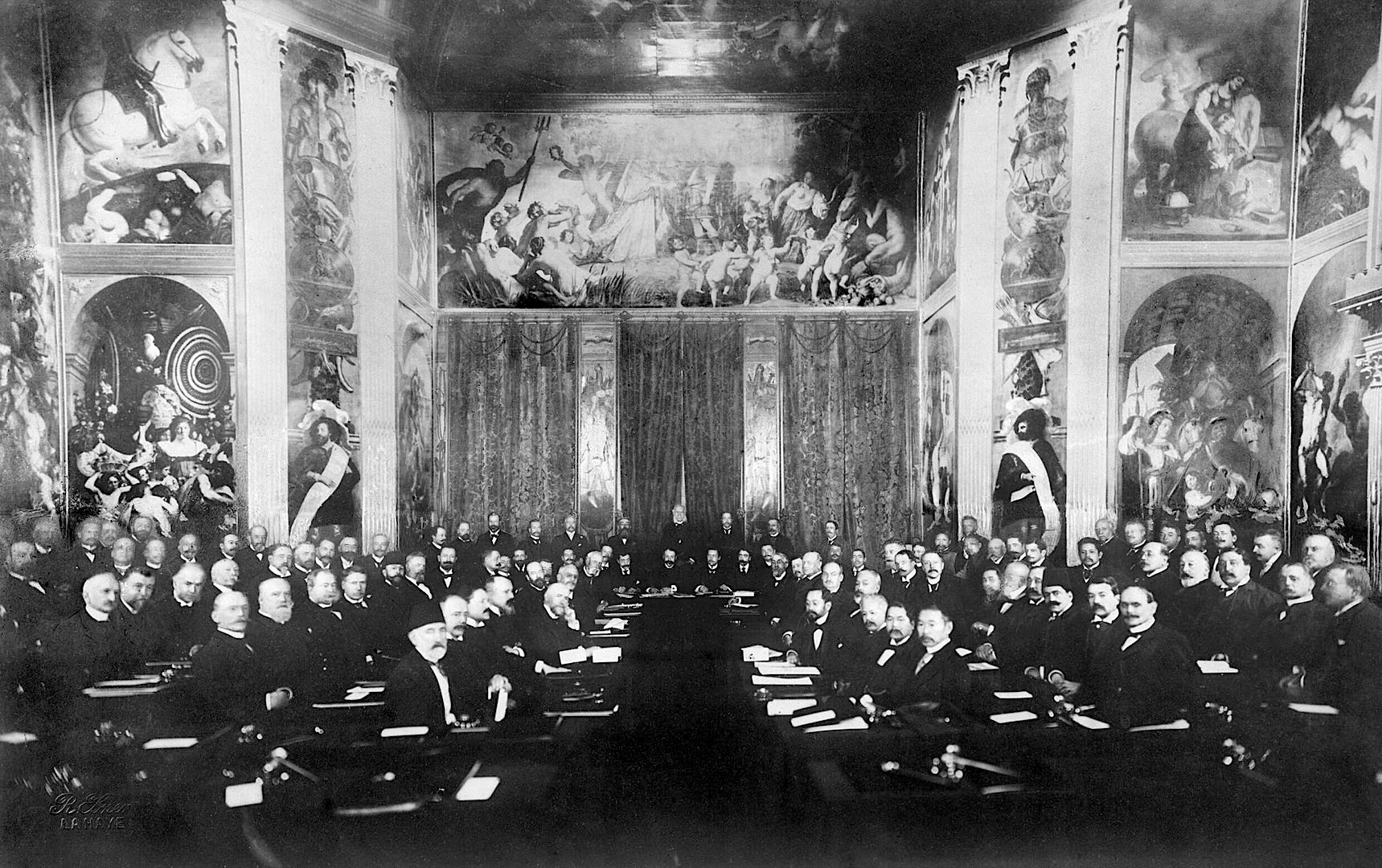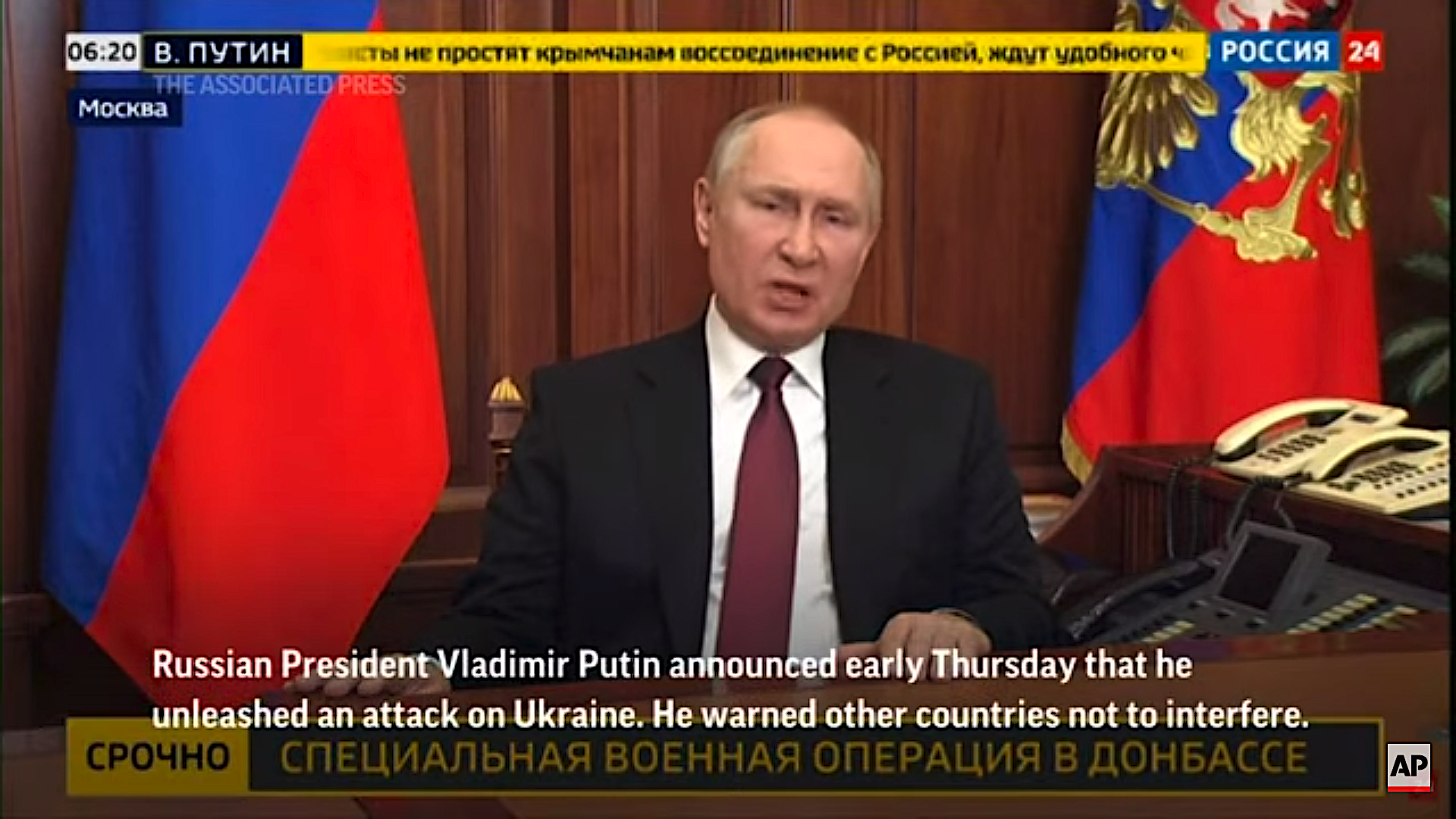Is Putin’s War Legal?
A thorough examination of legal precedent is necessary before coming to snap conclusions about Russia’s invasion, writes Joe Lauria.

The First International Peace Conference, the Hague, May – June 1899 Delegates to the Conference which was called by the Tsar of Russia to discuss world disarmament. (Imperial War Museum/Wikimedia Commons)
By Joe Lauria
Special to Consortium News
As Michael Brenner humorously pointed out in these pages last week, it has apparently become obligatory for any commentator on the Ukraine war to state upfront that Russia’s invasion of Ukraine is “illegal” before proceeding to list reasons why the U.S. and NATO bear responsibility for what Russia has done.
This declaration of “illegality,” however, is almost never accompanied by a detailed analysis of why it is illegal. The statement stands on its own, intended, it seems, to protect the author from the out-of-control barrage of criticism and censorship being widely leveled at anyone not strictly toeing the line against Russia.
Given the complexities of international law and the Ukraine situation, an explanation is indeed needed before passing legal judgement on Russia’s military action. That is precisely what military analyst Scott Ritter has given Consortium News readers in his article published Tuesday, “Russia, Ukraine, & the Law of War: Crime of Aggression.”
Why History Matters
Ritter goes back to Hugo Grotius, a 17th century Dutch legal scholar, to begin his modern history of the laws of war. Laws of war go back to the Code of Hammurabi in 2000 B.C. Babylonia; the Mahabharatain India (“One should not attack chariots with cavalry; chariot warriors should attack chariots”); the Hebrew Bible (“When you draw near to a city to fight against it, offer terms of peace to it”); and the Quran (“Fight in the way of Allah against those who fight against you, but begin not hostilities. Lo! Allah loveth not aggressors”).
The western tradition of laws of war was established in ancient Greece, where it was decreed that:
- “War should be openly declared and have a legitimate cause if the gods’ favor was to be expected.
- A pledged word must be kept. Oaths, sworn to the gods and accompanied by a sacrifice or libations, guaranteed treaties, truces and other agreements.”
Aristotle wrote: “The proper object of practising military training is not in order that men may enslave those who do not deserve slavery, but in order that first they may themselves avoid becoming enslaved to others” (Politics, Book 7).
Rome developed a concept of “just cause” for war, such as repelling an invasion or retaliating for pillage, codified by Cicero in De Officiis (On Duties or On Obligations) in 44 B.C. At some points during the Roman era priests were required to ritually to declare a just war, but this appears to have fallen out of favor once the Republic became an Empire. Julius Caesar for one is known to have ignored the requirements of just war.

The Miracle of St. Thomas Aquinas, Carafa Chapel, 1491 by Filippino Lippi. (Public Domain/Wikimedia Commons)
In the Christian era, the theory of just war was developed by St. Thomas Aquinas in the 13th century from earlier writings of St. Augustine, who lived in the 4th and 5th centuries. In Summa Theologica, Aquinas wrote that a war is just when it is commanded by a sovereign, when it avenges wrong to punish evildoers and with the aim of achieving peace:
“In order for a war to be just, three things are necessary. First, the authority of the sovereign by whose command the war is to be waged. For it is not the business of a private individual to declare war, because he can seek for redress of his rights from the tribunal of his superior.
A just war is wont to be described as one that avenges wrongs, when a nation or state has to be punished, for refusing to make amends for the wrongs inflicted by its subjects, or to restore what it has seized unjustly.
True religion looks upon as peaceful those wars that are waged not for motives of aggrandizement, or cruelty, but with the object of securing peace, of punishing evil-doers, and of uplifting the good. … The passion for inflicting harm, the cruel thirst for vengeance, an unpacific and relentless spirit, the fever of revolt, the lust of power, and such like things, all these are rightly condemned in war.”
The Roman Catholic Church still adheres to Augustine’s just war theory, though it has been under pressure to move away from it.
The Modern Era
Until the Hague Conventions of 1899 and 1907, the Lieber Code signed in 1863 by Abraham Lincoln, set out the rules of conduct during war for Western nations, for instance the treatment of spies, deserters and prisoners. It had probably the first prohibition against rape during war. The Hague Conventions further elaborated the laws of war and included procedures for states to declare war on one another.
It was not until the U.N. Charter of 1945 that this power to declare war was restricted to two specific instances, as Ritter lays out. The first is invocation of Article 51 of the Charter, the right to self-defense, and the second is through authorization of a U.N. Security Council resolution. Thus the rights of a sovereign to declare war, from ancient, through medieval and modern times, was abrogated.
Iraq Wars
Some writers on the Ukraine war who condemn Russia for an illegal act compare it to the 2003 U.S. invasion of Iraq as equal acts of aggression.
The phrase “false equivalency” was the mantra of U.S. cold warriors whenever someone pointed out that when the U.S. accused the Soviet Union, it was also guilty of wrongdoing. Since we are in a new cold war, the slogan is making a comeback. The U.S. ambassador to the U.N. uttered it recently in response to the Russian ambassador telling the Security Council that when it comes to invasions, Russia could not compete with the U.S.
Comparing the U.S. invasion of Iraq to the Russian invasion of Ukraine is a false equivalency on several grounds. The U.S. cried self defense, but Iraq was never remotely a threat to the territory of the United States, especially when the basis for this supposed threat, the existence of weapons of mass destruction, turned out to be cruelest lie of the century so far. There weren’t thousands of Americans killed in a civil war inside Iraq, which is nearly 10,000 kilometers away from Washington. Ukraine borders Russia.
Ritter goes into great detail about how the U.S. finessed the law, or outright tried to create new legal arguments to get around the U.N. charter in order to invade Iraq in 2003, as it had earlier in Kosovo in 1999. The 2003 invasion was denounced as “illegal” by U.N. Secretary-General Kofi Annan and nearly everyone in Washington now says it was maybe the biggest foreign policy blunder in U.S. history. As WikiLeaks has revealed, not only was the crime of aggression committed but also war crimes against civilians during the course of the war. And yet no one in government, the military or the media have paid the price.
It’s not just in Iraq and Serbia that the U.S. has made a mockery of the laws of war. There are abundant small examples from more obscure wars, like the 1989 invasion of Panama in which an entire poor neighborhood was pulverized, thousands of civilians were killed and there was no Security Council authorization. The U.S. said saving American lives allowed them to invade.
Then there was the time the U.S. massaged the law in the 1983 invasion of Grenada, which The New York Times — by today’s standards — took a very skeptical view of. In an article titled, “Legal Basis for Invasion,” the Times concludes that there wasn’t much of one. “The rationale suggested by the State Department today might be a significant departure insofar as it purports to provide a basis for ignoring the international law rules against invasions and interventions in the affairs of sovereign states whenever a few countries get together to form a collective security treaty,” the Times wrote on Oct. 27, 1983.
Putin’s Reasons to Invade
In an impassioned televised address on Feb. 24, Russian President Vladimir Putin laid out why he was sending Russian troops in Ukraine.
He made a point of how the U.S. had treated international law and the laws of war:
“First a bloody military operation was waged against Belgrade, without the UN Security Council’s sanction but with combat aircraft and missiles used in the heart of Europe. The bombing of peaceful cities and vital infrastructure went on for several weeks. I have to recall these facts, because some Western colleagues prefer to forget them, and when we mentioned the event, they prefer to avoid speaking about international law.
Then came the turn of Iraq, Libya and Syria. The illegal use of military power against Libya and the distortion of all the UN Security Council decisions on Libya ruined the state, created a huge seat of international terrorism, and pushed the country towards a humanitarian catastrophe, into the vortex of a civil war, which has continued there for years. The tragedy, which was created for hundreds of thousands and even millions of people not only in Libya but in the whole region, has led to a large-scale exodus from the Middle East and North Africa to Europe.
A similar fate was also prepared for Syria. The combat operations conducted by the Western coalition in that country without the Syrian government’s approval or UN Security Council’s sanction can only be defined as aggression and intervention.
But the example that stands apart from the above events is, of course, the invasion of Iraq without any legal grounds. They used the pretext of allegedly reliable information available in the United States about the presence of weapons of mass destruction in Iraq. To prove that allegation, the US Secretary of State held up a vial with white power, publicly, for the whole world to see, assuring the international community that it was a chemical warfare agent created in Iraq.
It later turned out that all of that was a fake and a sham, and that Iraq did not have any chemical weapons. Incredible and shocking but true. We witnessed lies made at the highest state level and voiced from the high UN rostrum. As a result we see a tremendous loss in human life, damage, destruction, and a colossal upsurge of terrorism.
Overall, it appears that nearly everywhere, in many regions of the world where the United States brought its law and order, this created bloody, non-healing wounds and the curse of international terrorism and extremism.”
Putin said the military operation he was launching was a “question of life or death” for Russia, referring to NATO’s expansion east since the late 1990s. He said:
“For the United States and its allies, it is a policy of containing Russia, with obvious geopolitical dividends. For our country, it is a matter of life and death, a matter of our historical future as a nation. This is not an exaggeration; this is a fact. It is not only a very real threat to our interests but to the very existence of our state and to its sovereignty. It is the red line which we have spoken about on numerous occasions. They have crossed it.”
Putin said he was also acting to save Russian speakers (many who have Russian passports) from a renewed offensive against them after eight years of attacks because they had rejected the 2014 U.S.-backed coup and declared independence from Ukraine. He said NATO and Ukraine:
“… did not leave us [Russia] any other option for defending Russia and our people, other than the one we are forced to use today. In these circumstances, we have to take bold and immediate action. The people’s republics of Donbass have asked Russia for help. In this context, in accordance with Article 51 of the U.N. Charter, with permission of Russia’s Federation Council, and in execution of the treaties of friendship and mutual assistance with the Donetsk People’s Republic and the Lugansk People’s Republic, ratified by the Federal Assembly on February 22, I made a decision to carry out a special military operation.”
Any nation state can legally ask another state to send them combat troops, such as Russia has done at the request of the Syrian government. At that point Russia was the only country in the world that recognized the Donbass republics. The Montevideo Convention of 1933 says that to be an independent state, it must possess a permanent population, a defined territory, a government, and the capacity to conduct international relations. It says nothing about how many other states must recognize it.
Putin may have considered invoking the doctrine of Responsibility to Protect to intervene to stop a massacre in Donbass, but Russia has not fully embraced the doctrine as it can be seen to hide ulterior motives, and it also requires authorization by a U.N. Security Council resolution, which the U.S., Britain and France would surely have vetoed.
In assessing Putin’s motives one sees that he is the sovereign who took the decision to avenge wrongdoing against ethnic Russians in Ukraine with his stated aim to restore peace and end the 8-year civil war rather than aggrandize power. Putin’s stated motives and reasoning exactly fit the three points of Aquinas’ just war theory, which the Catholic Church still actively supports. Aquinas, however, has no sway over the secular U.N. Security Council.
The Law of the Jungle
Pundit Caitlin Johnstone on March 17 pointed out the view of David McBride, an Oxford-educated Australian military lawyer who went to the media to blow the whistle on evident Australian war crimes in Afghanistan. He faces imprisonment. McBride tweeted:
McBride went on to tweet:
“We will pay a heavy price for our hubris of 2003 in the future. We didn’t just fail to punish Bush and Blair: we rewarded them. We re-elected them. We knighted them. If you want to see Putin in his true light imagine him landing a jet and then saying ‘Mission Accomplished.’ The justifications for the invasions of both Iraq and Ukraine are very similar: ‘They were hurting their own ppl. They have bad stuff that could harm us. We warned them to stop, or else. We had no choice but to step in to defend ourselves.’ The Russians didn’t blackmail the UN.”
Neither an Article 51 self-defense measure, nor a collective security resolution was ever passed by the Security Council. Therefore, according to the strict letter of today’s law, Russia’s invasion of Ukraine is illegal. But after what the U.S. has done tragically to the laws of war and the jungle it has created, it hardly seems to matter anymore.
Joe Lauria is editor-in-chief of Consortium News and a former U.N. correspondent for The Wall Street Journal, Boston Globe, and numerous other newspapers, including The Montreal Gazette and The Star of Johannesburg. He was an investigative reporter for the Sunday Times of London, a financial reporter for Bloomberg News and began his professional work as a 19-year old stringer for The New York Times. He can be reached at joelauria@consortiumnews.com and followed on Twitter @unjoe
https://consortiumnews.com/2022/03/29/is-putins-war-legal/







Geen opmerkingen:
Een reactie posten